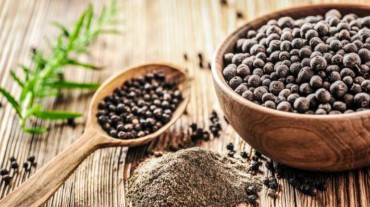
Dark spots are the areas on the skin that appear darker due to excess melanin production. Sun exposure is one of the causes of dark spots, and that explains why I ended up with dark spots! It’s winter, so I have been trying to soak up the sun as much as can. Sometimes I forget to wear a sunscreen, and so, my skin had to suffer. Interestingly, my mom told me to use black pepper to remove dark spots. And guess what? This home remedy did help to lighten the spots!
Hyperpigmentation is another name for dark spots. It is used to describe patches of skin that seem darker than the surrounding skin. These patches, which come in different hues and sizes, are usually the result of an overabundance of melanin, the pigment that gives skin its colour, says cosmetologist and skin expert Dr Jatin Mittal.

As people get older, their skin may find it more difficult to heal and rejuvenate, which can lead to the development of dark patches. There are more causes for the occurrence of dark spots:
Prolonged exposure to ultraviolet (UV) radiation from the sun can increase melanin synthesis, which can result in the development of black spots. These are commonly known as age spots or sunspots, explains Dr Mittal.
Melanin production can be triggered by inflammation and healing processes, like those linked to acne or other skin lesions, which can lead to the formation of dark spots.
Dark spots may arise as a result of hormonal fluctuations, particularly during pregnancy. They may also pop up if you have birth control pills.
Liver-related issues can impact skin health and the body’s ability to process and remove toxins, says cosmetologist and aromatherapist Pooja Nagdev. This can lead to skin discolouration and the development of dark spots.
Some medications such as certain antibiotics or antipsychotics, chemotherapy or antimalarial drugs may increase skin sensitivity. This can make people more prone to developing dark spots and may contribute to skin pigmentation changes.
For an accurate diagnosis and customised treatment plan, speak with a skin expert about the dark spots.
There isn’t scientific evidence to show that black pepper can treat dark spots. Although some of the components found in black pepper may have antioxidant and anti-inflammatory qualities, says Dr Mittal. Black pepper contains piperine, a compound with antioxidant and anti-inflammatory properties, adds Nagdev.
Select Topics of your interest and let us customize your feed.
PERSONALISE NOWWhen applied topically, it can help lighten dark spots by inhibiting melanin production. Piperine can stimulate blood flow, promoting skin regeneration and reducing pigmentation. Also, black pepper’s exfoliating properties may aid in removing dead skin cells, revealing fresher skin underneath.
The simple home remedy involves mixing ground black pepper with aloe vera gel, honey or yogurt to form a paste, which can be applied to dark spots. However, it is crucial to perform a patch test and avoid excessive use, as black pepper can be irritating for some people, warns Pooja Nagdev.

If you have sensitive skin, allergies or existing skin conditions, you should exercise caution when using black pepper topically. Piperine, the compound responsible for black pepper’s properties, may cause irritation, redness or an allergic reaction in some people. Those with skin conditions like eczema or psoriasis may find that black pepper exacerbates their symptoms.
Pregnant or breastfeeding women should also consult a doctor before using black pepper on the skin, as its safety in such situations is not well-established.
While natural remedies may offer benefits, consulting a dermatologist is advisable for personalised advice on treating dark spots. Some dark spots may fade on their own over time while others can be removed completely or lightened by using topical treatments. There are also cosmetic procedures such as laser treatment and chemical peels to remove dark spots.
Get Latest Updates on Mom Says